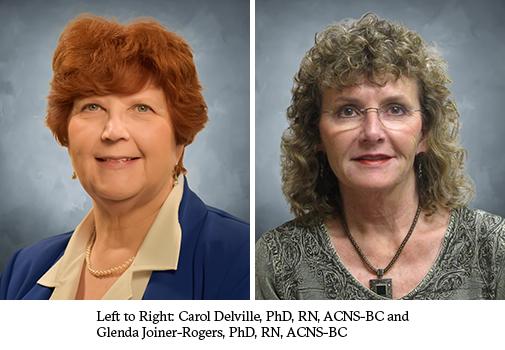Carol Delville, PhD, RN, ACNS-BC, clinical assistant professor in nursing, and Glenda Joiner-Rogers, PhD, RN, ACNS-BC, clinical assistant professor in nursing, have been recognized as Distinguished Educators in Gerontological Nursing by the National Hartford Center for Gerontological Nursing Excellence. The Hartford Center’s mission is to enhance and sustain the capacity and competency of nurses to provide quality care to older adults by supporting nurse research, education and practice. This is the first time the award, which recognizes the preparation, practice, and achievements of gerontological educators, has been given.

Delville and Joiner-Rogers teach in the UT Austin School of Nursing’s Adult-Gerontology Clinical Nurse Specialist program. This advanced practice program highlights the leadership role of the adult gerontology clinical nurse specialist (AGCNS), which is needed to achieve quality and cost-effective patient outcomes and to collaborate with other health care professionals to design and implement creative solutions to address system problems, nursing staff needs and/or patient care issues.
It integrates knowledge of disease and medical treatments into the assessment, diagnosis, and treatment of adult patient illnesses, and prepares graduates for prescriptive authority. Prescriptive authority allows the AGCNS to provide pharmacologic and nonpharmacologic treatments and other diagnostic and laboratory tests in addressing and managing specialty health problems of patients and populations.
“The goal of the adult gerontology CNS is to stabilize individuals for maximum function, preserve current function and prevent the progression of loss of function,” said Delville. “The older adult population is extremely complex because of overlapping co-morbidities and the number of medications prescribed to deal with those health issues. Many older adult patients may be subject to a polypharmacy, which means they may be taking as many as 20 medications or more to treat these diagnoses. When older adults take this many medications, it can impair their cognition and ability to function physically or care for themselves.”
“Our students soon realize it is imperative to manage and treat the patient problems, but also know how to peel away the non-critical medications in hopes of improving the individual’s quality of life,” Joiner-Rogers said. “We advise students to go back and, in collaboration with the patient and family, figure out the priority in the older person’s care. The older adult may see an improvement in cognition and functionality at that point.”
These are some of the issues that alumna Aline Zeringue, MSN, RN, ACNS-BC, encounters at ATX Primary Care, her nurse-owned practice.
“I’m drawn to the complexities that are involved in caring for older adults and the need to focus not only on physical issues of aging but psychosocial elements that often exist as well,” she said. “In our practice, we focus on preventative care in order to keep patients healthy and avoiding illness. We are diligent in recommending annual physicals for all adults and we review which health practices are age appropriate and necessary, such as immunizations and screening tests. Our goal is to be helpful in times of illness while promoting and fostering overall wellness throughout the lifespan.
“The holistic way I approach caring for a patient, the systematic way in which I evaluate information, and the way I implement current literature and research into my practice are all direct results of the way I was educated at UT Austin,” Aline added. “The emphasis of the program on critical thinking skills most certainly shaped the way I handle problems in my career today.”
In addition to teaching and working in the same long-term care practice as adult health care providers, Delville and Joiner-Rogers are involved with the School of Nursing’s Center for Excellence in Aging Services and Long Term Care. This center is under the direction of Tracie Harrison, PhD, RN, CS, FGSA, FAAN, professor and a nationally renowned gerontology nurse, and has partnered with the Texas Health and Human Services Commission to offer education and training to providers who work in long-term care settings and lay learners interested in long-term services and supports.
One of the goals of the Texas HHS Commission is to eventually have advanced practice nurses placed in every long-term care facility in the state. Toward that end, the Center for Excellence shares research-based geriatric and disability best practices on their website and in frequent seminars. They also co-host with the HHS a free annual two-day geriatric symposium for family members and professionals who work with older adults.
“One of the best things about this event is that it brings together a variety of health care providers and those associated with health care, such as social workers, pharmacists and recreational therapists,” said Delville, who regularly presents at the annual event. “Rarely do we get to hear from multi-disciplinary groups and get their perspective and share ours.”
The next Center for Excellence in Aging Services and Long Term Care symposium will be held in August in Austin, Texas. The presentation of the Distinguished Educators in Gerontological Nursing award was made in November at the Hartford Leadership Conference in Boston.

